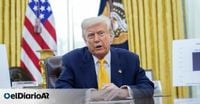On March 30, 2025, President Donald Trump intensified economic pressure on the Venezuelan government led by Nicolás Maduro by revoking export permits for several international oil companies. This significant move affects major players in the oil industry, including Spain's Repsol, Italy's Eni, France's Maurel & Prom, and India's Reliance Industries, all previously granted special authorizations during the Biden administration to process Venezuelan crude.
The revocation of these permits is part of a broader strategy by the Trump administration to isolate Venezuela economically. Companies now face a deadline of May 2025 to liquidate their operations in Venezuela, marking a dramatic shift in U.S. foreign policy towards the South American nation.
According to reports, these companies had already suspended imports of Venezuelan oil following Trump's recent imposition of a 25% tariff on any country purchasing Venezuelan crude and gas. This tariff is designed to further restrict Venezuela's access to international markets, making it increasingly difficult for the Maduro government to sustain its economy.
Trump's actions have drawn sharp criticism from Maduro, who responded defiantly, stating, "Venezuela is not a colony of anyone; it is a free country." In a video shared via Telegram, he emphasized that Venezuela seeks respectful and cooperative relations but will not bow to external pressures. "Those who lose are the aggressors, not us," Maduro declared.
In addition to revoking the permits, Trump also canceled a crucial license previously granted to Chevron, another American oil company, which will now have to dismantle its facilities in Venezuela. This further compounds the economic challenges facing the Maduro regime, which has struggled to maintain oil production levels amid ongoing sanctions and political turmoil.
The backdrop to this economic confrontation includes a growing diplomatic rift between Washington and Caracas, particularly regarding the repatriation of Venezuelan migrants deported from the U.S. Despite these tensions, the Venezuelan government has stated its willingness to accept repatriated citizens, with a recent flight bringing 229 Venezuelans back home.
In February 2025, Venezuela exported approximately 910,000 barrels of crude and fuel daily, an increase from 867,000 in January. However, the new restrictions imposed by the Trump administration are expected to significantly impact these figures moving forward.
Maduro's government has consistently framed U.S. sanctions as an attack on Venezuela's sovereignty, arguing that they are part of a broader strategy to undermine the socialist government. He has criticized the World Trade Organization (WTO), claiming it is "almost mortally wounded" due to the chaotic nature of global trade wars and economic aggression against various nations.
As the situation unfolds, the ramifications of Trump's decision are likely to resonate across global oil markets and contribute to the ongoing instability within Venezuela. The combination of sanctions, tariffs, and the revocation of operational permits signals a toughening stance from the U.S. that could lead to further economic decline in Venezuela.
This latest escalation in U.S. policy not only affects the Venezuelan economy but also complicates the international community's efforts to address the humanitarian crisis that has emerged from years of economic mismanagement and political strife in the country.
With the deadline for these companies to cease operations approaching, the future of Venezuela's oil industry hangs in the balance, while the Maduro government braces for the fallout from these stringent measures. The interplay between U.S. foreign policy and Venezuela's domestic challenges will continue to evolve, shaping the geopolitical landscape in the region.







